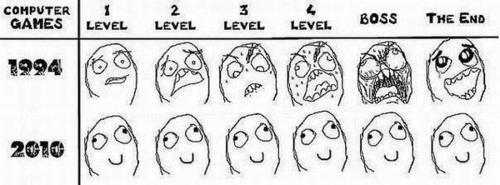Difficulty is a hard thing to debate. Person A says “I thought the later levels of Far Cry were poorly balanced” and Person B says “QQ moar, you just want EZ mode.” It’s hard to quantify, especially considering we couldn’t go a page on medkits without people insulting each other. :)
I finished all the GTA games, and while there were missions I found harder than others, I often found them satisfying, because the games were open enough that you could often concoct a strat to turn things in your favor. “hey, instead of chasing these guys on a motorcycle, I’ll steal a helicopter and cut them off from the air.” You couldn’t solve every mission like that, but at least you felt like you had options a lot of the time.
I also played a lot of the Midnight Club games, which, predictably, felt more restrictive. A lot of racing games come down to pinpoint execution, and it would get frustrating when you feel like you hit 19/20 turns perfectly but lose because some rubberband AI caught up to you at the last second and knocked you off course on the final turn. In that case, it felt like the game was cheating to beat you, and that gets frustrating quickly.
The worst example I can think of was the final boss fight against the devil in Guitar Hero III Expert. I could write pages about what was wrong with the fight, but in short, you didn’t just need to be exceptionally good, you needed the RNG gods to bless you with the right sequence of powerups, which you didn’t get 90% of the time and caused a guaranteed loss. To make it worse, you had to sit through a minute of the song before getting to the battle portion, which was like adding an unneccessary cutscene to an already unbalanced fight.
I guess what it comes down to for me is fairness. I don’t mind a boss with a zillion hitpoints, but when your rank-and-file grunts can take multiple headshots, it feels a little silly. I’d be happier with 20 enemies flooding out of a barracks than bunch of guys spawning in front of me out of thin air. I remember Black Hawk Down had gripping, wide-open sections where you had to cross giant areas with gunfire flying in every direction, but also a lot of “gotcha!” trap deaths that were almost impossible to avoid the first time through. I guess “difficulty” doesn’t really bother me as long as I feel like the designer is playing fair.
